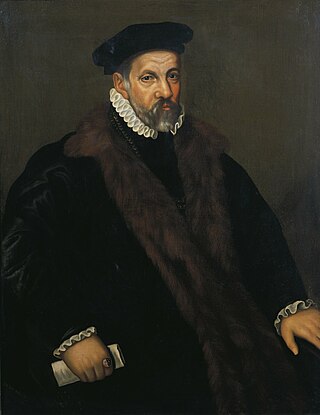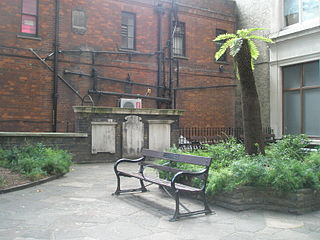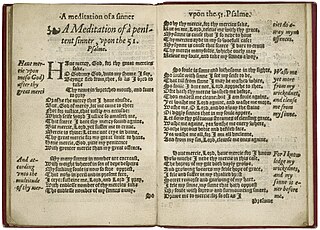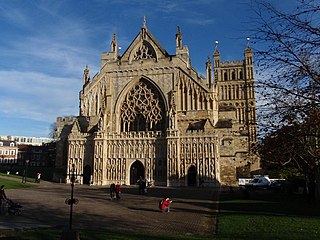Related Research Articles

David Beaton was Archbishop of St Andrews and the last Scottish cardinal prior to the Reformation.

Sir William Butts was a member of King Henry VIII of England's court and was the King's physician.
Sir Edmund Bedingfield or Bedingfeld. was the third son of Sir Edmund Bedingfield, Knight of the Bath, and his second wife Dame Margaret, daughter of Sir John Scott, of Scot's Hall in Kent. Sir Edmund the father died in 1496-97, making his will at Calais. His widow died in 1514, having made her will the previous year, in which she established the Bedingfield chapel in St John's parish church at Oxborough.
The Complaintof RoderickMors, by Henry Brinklow, is a well-known example of 'complaint literature' of the mid-Tudor period.

Thomas Wilson (1524–1581), Esquire, LL.D., was an English diplomat and judge who served as a privy councillor and Secretary of State (1577–81) to Queen Elizabeth I. He is remembered especially for his Logique (1551) and The Arte of Rhetorique (1553), which have been called "the first complete works on logic and rhetoric in English".
Peter Osborne, Esquire, (1521–1592) was an English officer of state who was Keeper of the Privy Purse to King Edward VI, at a time when great constitutional changes affected the management of public finance. Of reformist sympathies in religion, his career was in abeyance during the reign of Queen Mary but regained momentum as Remembrancer in the Exchequer under Elizabeth, working usually to his marital kinsman Lord Burghley. He also sat in seven parliaments between 1559 and 1589.
Brinklow may refer to:
Events from the 1540s in England.

St Peter, Westcheap, also called "St Peter Cheap", "St Peter at the Cross in Cheap", or "Ecclesia S. Petri de Wodestreet", was a parish and parish church of medieval origins in the City of London. The church stood at the south-west corner of Wood Street where it opens onto Cheapside, directly facing the old Cheapside Cross. In its heyday it was a familiar landmark where the City waits used to stand on the roof and play as the great processions went past. It was destroyed in the Great Fire of London in 1666, together with most of its surroundings, and was never rebuilt.

Anne Locke was an English poet, translator and Calvinist religious figure. She has been called the first English author to publish a sonnet sequence, A Meditation of a Penitent Sinner (1560), although authorship of that work has arguably been attributed to Thomas Norton.
Stephen Vaughan (1502-1549) was an English merchant, royal agent and diplomat, and supporter of the Protestant Reformation.

Sir Martin Bowes was a very prominent and active civic dignitary of Tudor London whose career continued through the reigns of Henry VIII, Edward VI, Mary I and Elizabeth I. Born into the citizenry of York, Bowes was apprenticed in London and made his career at the Royal Mint, as a master-worker and under-treasurer, and personally implemented the debasement of English currency which became a fiscal imperative in the later reign of Henry.
John Lassells was an English sixteenth-century courtier and Protestant martyr. His report to Archbishop Thomas Cranmer initiated the investigation which led to the execution of Queen Catherine Howard.
Sir John Garrard, sometimes spelled Gerrard, was a merchant and alderman of the City of London, six times Master of the Worshipful Company of Haberdashers, a Buckinghamshire landowner, and Lord Mayor of London for the year 1601 to 1602.
John Gwynneth, was a clergyman of Welsh nationality originating from Gwynedd, and was a composer of religious and liturgical vocal music for which he was awarded a doctorate in the University of Oxford. He held benefices in England in Northamptonshire, Bedfordshire and London, and in North Wales at Clynnog Fawr. Although he was a polemicist for the Catholic faith, he maintained his ministry through the reigns of Henry VIII, Edward VI and Queen Mary, and was brother-in-law and executor of Stephen Vaughan. He is principally remembered, from the age of Thomas Tallis, as one of the other exponents of early Tudor period polyphony.
John Huntingdon was an English Protestant preacher. He was a client of Mary Fitzroy, and "one of London's most popular and most effective preachers."
Lieutenant Admiral Sir William Woodhouse was an English naval commander and administrator who rose to the rank of Lieutenant of the Admiralty and was head of the Council of the Marine later called the Navy Board. He also served as a Member of Parliament of the Parliament of England from 1545 to 1564. He was prominent during an important time of the Navy Royal's development in the later half of the Tudor period.
Sir William Chester was one of the leading English Merchants of the Staple and Merchant Adventurers of the mid-16th century, five times Master of the Worshipful Company of Drapers, Lord Mayor of London in the year 1560–61 and Member of Parliament for the City of London. He should not be confused with his contemporary, William Chester, merchant of Bristol, M.P.
Geoffrey Chamber was a legal advocate, an associate and agent of Thomas Cromwell's, and was Surveyor and Receiver-General to the Court of Augmentations at the time of the Dissolution of the Monasteries. He was connected with the discovery of the mechanical contrivances in the Rood of Grace at Boxley Abbey.

Nicholas Marston was a 16th century English priest. It is uncertain whether his appointment as Archdeacon of Cornwall in 1574 took effect. He was one of three brothers, who had ecclesiastical careers in the Cathedral church of Exeter, and in that diocese within Cornwall and Devon. Their father was a wealthy citizen Haberdasher in the city of London who gave financial support to the early career of his wife's brother William Bradbridge, later bishop of Exeter. Thomas's daughters made advantageous City marriages, and the network of their mercantile patronage and relations with the bishops, deans and chapters of Exeter and of Bath and Wells, and with the University of Oxford, spanned several decades of the Tudor and early Stuart period.
References
- 1 2 GIGA Quotes: Henry Brinklow
- 1 2 3 4 5 6 7 Alec Ryrie, ‘Brinklow , Henry (d. 1545/6)’, Oxford Dictionary of National Biography , Oxford University Press, 2004. Retrieved 30 September 2006
- ↑ Will of Robert Brynklowe (P.C.C. 1543, Spert quire).
- ↑ Thus Chester (below). She is stated to be Henry's mother by A. Ryrie, 'Brinklow [Brinkelow], Henry [pseud. Roderyck or Roderigo Mors] (d. 1545/6)', Oxford Dictionary of National Biography (2004).
- ↑ Will of Isabell brynklowe, of Redyng, widow (P.C.C. 1545, Pynning quire).
- ↑ J.L. Chester, 'Notes Relating to the Family of Brinklow', in J. Meadows Cowper (ed.), Henry Brinklow's Complaynt of Roderyck Mors, Early English Text Society (Trübner and Co., London 1874), pp. 121-25 (Internet Archive).
- ↑ A.F. Pollard, 'Vaughan, Stephen (d. 1549), diplomatist', Dictionary of National Biography (1885-1900), vol. 58.
- ↑ The National Archives (UK), Chancery: Vaughan v Rolles, ref. C 1/1319/9-11 and C 1/1319/12-14.
- ↑ The National Archives (UK), Chancery, Pleadings: Chamberlayn v Guyneth, C 1/1339/16-20, and C 18/10/26; Final decree: Chamberlayne v Gwnyneth [ sic , recte Gwyneth], ref. C 78/10/26, View original at AALT, images 0025 and 0026.
- ↑ Journal of Political Ecology: review of Neal Wood's Foundations of Political Economy: Some Early Tudor Views on State and Society Archived 23 November 2004 at the Wayback Machine
- ↑ The Hospitals of Later Medieval London, by Carole Radcliffe [ permanent dead link ]. The essay itself references. for the quote, J. Meadows Cowper (editor), Henry Brinklow's complaint, Early English Text Society, 1874, extra series 22:52.]
- ↑ Healing the Sick Poor: Social Policy and Disability in Norwich 1550–1640, by Margaret Pelling [ permanent dead link ], itself referencing: Webster (1975), op. cit. (i.e. C. Webster, The great instauration: science, medicine and reform 1626–1660, London, Duckworth, 1975), note 1 above, p. 291. The essay also tells us to see also: the schemes of "Dr Turnbull", ibid. (i.e. P. Slack, Poverty and politics in Salisbury 1597–1666, in P. Clark and P. Slack (editors), Crisis and order in English towns 1500–1700, London, Routledge & Kegan Paul, 1972), p. 300. The essay also references: Henry Brinklow, Complaynt of Roderyck Mors [c. 1542], ed. by J. M. Cowper, Early English Text Soc., Extra Ser. vol. 22, 1874, p. 52.]
- 1 2 "World of Quotes: Henry Brinklow". Archived from the original on 7 August 2006. Retrieved 18 June 2006.